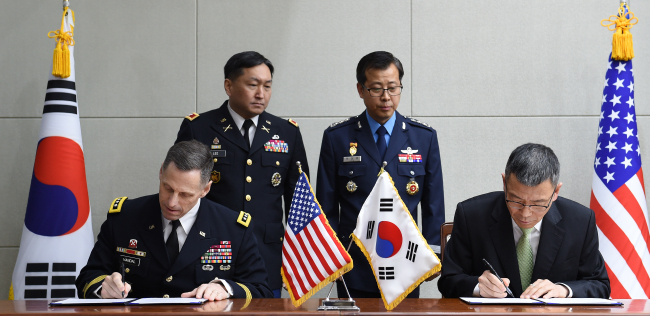South Korea and the U.S. launched the official talks on deploying an advanced U.S. missile defense system here against North Korean threats, the Defense Ministry said Friday.
The ministry and the U.S. Forces Korea signed an agreement on composition and operation of the joint working group that will discuss details on stationing Terminal High Altitude Area Defense system in the country.
Seoul’s Deputy Defense Minister Yoo Jeh-seung and U.S. Army commander Lt. Gen. Thomas S. Vandal signed the agreement on Friday. The sides are co-headed by South Korean Defense Ministry’s director general Maj. Gen. Jang Kyung-soo and USFK’s Maj. Gen. Robert Hedelund.
 |
| South Korea’s Deputy Defense Minister Yoo Jeh-seung(right) and U.S. Army commander Lt. Gen. Thomas S. Vandal sign an agreement on composition and operation of the joint working group on THAAD talks at the ministry compound in Seoul on Friday. (Yonhap) |
“In accordance to the agreement, South Korea and the U.S. will hold talks on the feasibility of deploying THAAD — which will be operated by the USFK — as part of the effort to boost the allies’ missile defense system,” the ministry said in a statement.
The joint working group held its first meeting at the ministry compound at 3 p.m. The group will discuss issues regarding the location of THAAD, safety concerns, cost-sharing and the timeline for further talks.
While the ministry has stated that the U.S. will shoulder all costs, it added that an additional budget could be allocated to procure the site for the system.
Officials with expertise in military strategy, facilities, environment, law and diplomacy will take part in the group, which will consist of no more than 10 members. Civilian consultations will be sought based on need, the ministry said.
“The THAAD system will contribute to defending South Korea from the growing nuclear and missile threats from the North,” the Defense Ministry said in a statement.
The outcome of the working group talks will be reported to the defense ministers of both sides for review, to be later endorsed by the governments.
The potential deployment of THAAD, which Seoul has repeatedly called “the most accurate missile defense system,” comes on the heels of the U.N. Security Council adopting a resolution specifying tough sanctions against North Korea. Pyongyang had sparked international furor with its Jan. 6 nuclear testing and Feb. 7 long-range rocket launch.
But Friday’s briefing revealed a lack of consistency in South Korea’s stance on THAAD, which has faced opposition over health concerns and fears that its deployment may deteriorate Seoul-Beijing relationship.
The announcement for the launch of official talks encountered last-minute delays last month, just hours before China and the U.S. held an official discussion on the sanctions against North Korea. This sparked speculation that deploying THAAD was related to getting China to participate in sanctions on the North, despite the allies saying Monday that the two issues are unrelated.
China and Russia have stated their opposition to the THAAD deployment, saying that installing it on the peninsula could damage the region’s security balance.
A high-ranking Defense Ministry official, speaking on condition of anonymity, reiterated that THAAD was never a bargaining chip for Chinese cooperation, but another high-ranking official from Cheong Wa Dae told reporters the same day that the two issues were related.
“Seeing as China has kept mentioning THAAD, it can be said that (THAAD) is somewhat related to China making a strategic decision at the U.N.,” the official was quoted as saying.
The Defense Ministry’s comments were also seen as contradictory, as it flatly ruled out the possibility of the THAAD plan being scrapped but also said the allies were discussing the “feasibility” of the deployment.
Cheong Seong-chang, a senior research fellow at the local think tank at Sejong Institute, pointed out subtle differences in how the allies have approached the THAAD issue. The U.S. military commander in the Pacific, Harry Harris, recently said that the consultation on THAAD did not necessarily equate to a decision to actually deploy the system.
“The U.S. appears to have more ‘flexible’ stance toward THAAD, as if to open a door for possible compromise with China. South Korea, on the other hand, appears to cling more desperately to THAAD, as scrapping the plan may result in losing face,” he said.
Cheong said in the process of pursuing THAAD, Seoul may have hampered its relationship with Beijing.
Wu Dawei, China’s special representative for Korean affairs and top nuclear negotiator, said that THAAD’s radar will act as “the eye of the U.S.” He said China will interpret the stationing of THAAD here as being equivalent to the U.S. moving its bases 800 kilometers nearer to the country.
By Yoon Min-sik
(minsikyoon@heraldcorp.com)

